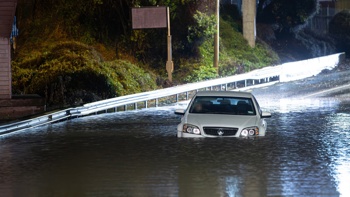

WARNING. This story makes reference to sexual assault on a child.
An English-born Kiwi who moved to Australia in 2014 has lost his fight to remain across the ditch after being found guilty of sexually molesting a 10-year-old boy.
Michael Andrew Hughes, a primary school teacher who until this offence had “never had a speeding ticket”, will be sent back to New Zealand as a 501 deportee after he failed to convince Australian authorities not to cancel his visa.
Mandatory cancellation followed the 58-year-old’s conviction and subsequent prison sentence after a jury in the Perth District Court found him guilty in August last year on a charge of “indecent dealing with a child under 13″.
He denied the offending.
Hughes, who argued he had no support and nowhere to live if forced to return to New Zealand, was born in the United Kingdom and immigrated to New Zealand when he was a young child.
He testified that he was also a UK citizen but indicated he would return to New Zealand if his visa remained cancelled.
He settled in Australia in 2014 to be near family who had moved there several years earlier.
Hughes was granted a Skilled Independent Class visa in January 2023.
Background to offending
In April 2022 he was on a caravanning holiday with family members when he met the victim and his family who were also staying at the campsite where the offence occurred.
The victim was invited by Hughes’ younger family members to stay the night in their caravan, on agreement from the victim’s parents.
In summary, the sentencing judge said the victim and others had showered individually in Hughes’ caravan, and at one point he opened the shower door while the victim was taking his shower.
He was later molested while lying in his bunk, despite having told Hughes to stop what he was doing on more than one occasion.
Afterwards, the victim said he had something to drop off at his tent.
He then ran to where his mother and stepfather were asleep, unzipped the tent, jumped in and zipped it closed.
The action woke his mother with a start. She found him scared and upset, and breathing heavily.
The victim’s stepfather confronted Hughes and police attended. The child was interviewed the following morning by a specialist child witness interviewer.
Hughes denied touching the child and claimed the others in the caravan were awake during the claimed incident.
On September 22 last year, he was convicted and sentenced to 20 months in prison. His visa was cancelled two months later.
Efforts to reverse deportation decision
Hughes then sought to have the cancellation decision revoked through representations to the Minister for Immigration, Citizenship, and Multicultural Affairs.
Hughes also tried appealing against his conviction but it was dismissed by the Court of Appeal of the Supreme Court of Western Australia in May. He was released on parole in July and moved to the Yongah Hill Detention Centre.
Hughes indicated at the time of the visa revocation hearing before the Administrative Appeals Tribunal of Australia that he was considering further avenues to challenge the decision.
In June, Hughes was told that the visa cancellation decision still stood, and he lodged an application for a review of that decision.
He claimed that the minister’s decision was wrong because the department had “not applied the law correctly”, in that assertions used to calculate the weight of specific criteria were overstated in some instances, and understated in others.
He contended that “a properly balanced view of all the facts” in his case would support the revocation of the cancellation decision.
Hughes also claimed he was not guilty of the offence for which he was convicted, and the information on which it was based was false.
The minister, as the respondent, said the judge’s sentencing remarks demonstrated the impact of the offending on the victim including psychological and emotional trauma.
They also noted the child’s parents’ feelings of guilt and anger and the “significant” impact of the offending on the family.
Last week, the tribunal affirmed the decision not to revoke the mandatory cancellation of Hughes’ visa which means he will have to leave Australia.
It said that having regard to all the evidence, it was unable to accept Hughes’ alternative version of events as credible, even if it were open to the tribunal to do so.
It accepted he would likely face significant emotional hardship because of separation from family members in Australia who, bewildered by the events of the last two years, indicated it was unlikely they would return to New Zealand.
Many provided strong character references that showed Hughes had lived an otherwise blameless, and law-abiding life as a key member of the family and community.
One family member said “Australia was now home” and that coming back to New Zealand would be a huge backwards step.
The family member also said it would be “cold” sending Hughes back to nobody.
“Everything is here. Everything. We’ve been good citizens and we’ve contributed well.
“To go back to New Zealand is going back, just going so way back.”
In making its decision the tribunal said a primary consideration was the protection of the Australian community, despite the low risk Hughes presented.
It acknowledged the impact the decision would have on Hughes’ family and friends who were convinced he was innocent.
MALE SEXUAL ABUSE SURVIVORS
Where to get help:
If it's an emergency and you feel that you or someone else is at risk, call 111.
• If you've ever experienced sexual assault or abuse and need to talk to someone call the confidential crisis helpline Safe to Talk on 0800 044 334 or text 4334. (available 24/7)
• Male Survivors Aotearoa offers a range of confidential support at centres across New Zealand - find your closest one here.
• Men and Trauma New Zealand: 0800 636 263
• Alternatively contact your local police station - click here for a list.
If you have been abused, remember it's not your fault.
Tracy Neal is a Nelson-based Open Justice reporter at NZME. She was previously RNZ’s regional reporter in Nelson-Marlborough and has covered general news, including court and local government for the Nelson Mail.

Take your Radio, Podcasts and Music with you









